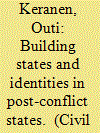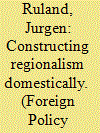| Srl | Item |
| 1 |
ID:
133578


|
|
|
|
|
| Publication |
2014.
|
| Summary/Abstract |
An integral part of state formation processes is identity-building: 'making one out of many' as Walzer puts it. This is also true in terms of contemporary, internationally led statebuilding projects. This dimension of international statebuilding is important, as fundamental questions pertaining to belonging are as important to successful post-conflict process as institutional arrangements; in fact, assumptions about identities and group boundaries guide the technical decisions on institutional and governance structures. The central aim of this paper is to reflect upon identity-construction as a part of post-conflict statebuilding through exploring how historical and more recently invented symbols are deployed to construct a specific sense of belonging. The analysis finds a multiplicity of identity-building projects that advance different visions of community and belonging. The outcome is politicised and contentious visual, everyday landscape that legitimises competing local statebuilding projects (grounded in the distinctions between Bosnian peoples), while undermining peacebuilding and reconciliation. Yet, rather than indicating a primordial antagonisms or incompatible 'liberal' and 'local' norms, the conflicts over symbols (and ultimately, identities) between international and local agents are indicative of wider disagreements over how the Bosnian state ought to be organised and are fuelled by the institutional structures of the country and the weaknesses in the international statebuilding
|
|
|
|
|
|
|
|
|
|
|
|
|
|
|
|
| 2 |
ID:
131062


|
|
|
|
|
| Publication |
2014.
|
| Summary/Abstract |
There is a dearth of studies exploring the construction of ideas on regionalism outside Europe. This article seeks to make a contribution to close this gap. It examines the construction of ideas on regionalism in Indonesia, the largest member country of the Association of Southeast Asian Nations (ASEAN). Theoretically, the paper draws from Acharya's concept of "constitutive localization" which it develops further. It offers an alternative explanation to studies which argue that as a result of mimetic behavior, social learning, and cost-benefit calculations, regional organizations across the world become increasingly similar. While this may be the case in terms of rhetoric and organizational structure, it is not necessarily the case at a normative level. The Indonesian case shows that even though foreign policy stakeholders have increasingly championed European ideas of regional integration after the Asian Financial Crisis of 1997/1998, they have skillfully amalgamated them with older local worldviews through framing, grafting, and pruning. European ideas of regional integration thereby served to modernize and relegitimize a foreign policy agenda which seeks to establish Indonesia as a regional leader with ambitions to play a major role in global politics.
|
|
|
|
|
|
|
|
|
|
|
|
|
|
|
|
| 3 |
ID:
133560


|
|
|
|
|
| Publication |
2014.
|
| Summary/Abstract |
This is a review article of two books that respond to convergences and turning points in how societies undergoing peacebuilding processes respond and engage with such processes. The two books demonstrate that these interventions are not an overpowering and coherent strategy, and even less so a practice. They suffer constraints and blowbacks in such a way that their moral, political and even military power is not as hegemonic or universally applicable as it was once portrayed in the literature. The different use of 'challenges' and 'resistance' to conceptualise these constraints and blowbacks points to the need for further research on how different actors interact beyond their role as interveners, peacekeepers or local actors.
|
|
|
|
|
|
|
|
|
|
|
|
|
|
|
|